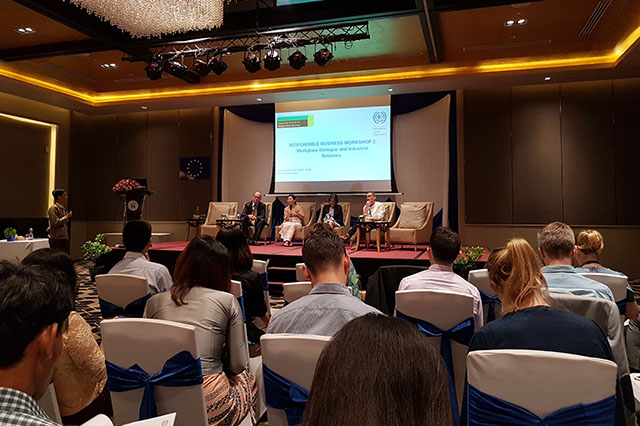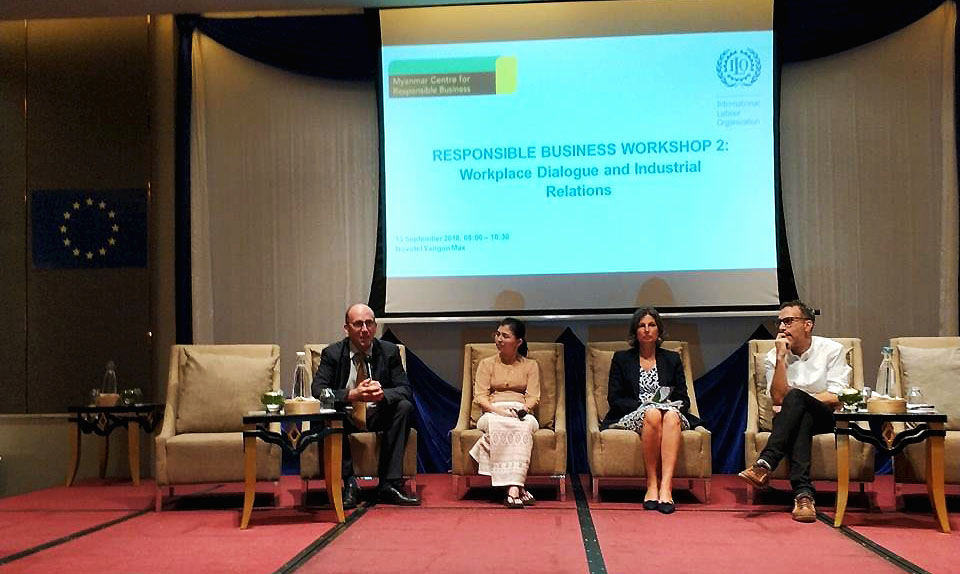Workplace Dialogue is Essential to Prevent Disputes

On 13 September 2018, MCRB and ILO hosted the second of its ‘responsible business seminars’, following on from the kick-off on responsible business due diligence on 5 July. This seminar’s focus was on “Decent work: Employment, working conditions, industrial relations and unacceptable forms of work”.
The seminar was intended to provide Myanmar and foreign businesses with practical advice and to facilitate dialogue on how to promote effective industrial relations and workplace dialogue as an essential part of responsible supply chains. The event was sponsored under the joint EU-ILO-OECD initiative on Promoting Responsible Supply Chains in Asia, with funding from the European Union, and was attended by around 60 participants from companies, consultancies, Embassies and NGOs.
In her presentation, Githa Roelans, Unit Head, Multinational Enterprise and Enterprise Engagement Unit, ILO, Enterprises department, ILO Geneva, outlined the various international standards relevant to labour rights and emphasised the centrality of the 1998 ILO Declaration on Fundamental Principles and Rights at Work and the 2017 MNE Declaration (5th edition) in guiding business policies and practices. Githa identified the importance of good industrial relations and workplace cooperation as central elements in building sustainable enterprises and when doing due diligence. She highlighted the importance of mutual respect, collaboration and dialogue to build trust between employers and workers as the best means to improve working conditions, to prevent conflict and reduce the risk of escalation of workplace disputes. She provided details of resources and assistance available from the ILO.
Tobias Fischer, Myanmar Country Manager of H&M, which buys from around 40 Myanmar garment factories, and is the indirect employer of 40,000 Myanmar workers, provided data on absenteeism rates in their Myanmar factories (at least 4%) and high labour turnover (9% per month) which reduces productivity. Data from around 10 of H&M’s suppliers show that around 39% of lost production time is due to absenteeism, and 19% due to staff turnover. Better communication and industrial relations contributes to reducing these rates which are a significant contributor to factory downtime and Myanmar’s productivity levels which are lower than Vietnam and Cambodia.
Tobias described the H&M-SIDA-ILO Garment Industry Programme (GIP) which seeks to promote more mature industrial relations at industry and factory level, including collective bargaining. H&M is also a member of ACT, an organisation promoting living wages, including through fairer buyer purchasing practices, which is developing outreach to Myanmar. Tobias also highlighted the value of H&M’s strategic alliances such as its global relationship with IndustriALL and in Myanmar with the CTUM, and the value of these partnerships based on trust and good faith, for example in mediating in the case of wildcat strikes. The goal should be to create common ground and win-win solutions
Tobias identified the importance of foreign investors – including the many Chinese-owned factories from which they source – understanding the cultural preferences of their workforce. He gave as an a Chinese manufacturer who wanted to reward their workforce with gifts. Applying a Chinese mindset, they wanted to give them sweets and Coke. However engagement showed the employer that the workforce would prefer cooking oil instead. Getting these small points right helps to build trust but cultural understanding needs to be two-way, with Myanmar workers understanding Chinese management. Much information was lost in translation – ‘Chinese whispers’; pictures were often a better way to communicate. Patience is essential.
Sabeh Lwin, the Human Resources Manager of EMC Manufacturing – a Hong Kong-based company producing handbags in Mingaladon, Yangon – described the productivity benefits they had experienced by improving workplace dialogue. Prior to 2016, the EMC factory had regular disputes and strikes about practical issues, including cases taken to the Township labour office. Despite having a Workplace Coordinating Committee as mandated under Myanmar law, this had not been able to solve these problems effectively. After 2016, EMC changed their approach with more direct discussion between supervisors and human resources managers, and also began weekly training on factory rules and labour laws, especially on leave and working hours. They had collected data that showed that greater awareness of employee rights led to reduced absenteeism and less conflict. She outlined disciplinary processes.
The subsequent Q&A, chaired by Rory Mungoven, ILO Liaison Officer in Myanmar, highlighted the value of labour unions in collective bargaining agreements, since they were a representative institution with legal status which would outlive individual employees, particularly important in factories with high staff turnover. The challenges of an effective Workplace Coordination Committees were discussed; basic meeting skills e.g. agendas, minutes etc needed to be developed. The Garment Industry Programme was developing a training module on WCC which would be publicly available and of wider use beyond the sector. One company shared that annual or biannual anonymous staff surveys were a useful way to understand employee sentiment and identify follow-up.

 English
English မြန်မာ
မြန်မာ မြန်မာ (unicode)
မြန်မာ (unicode)










